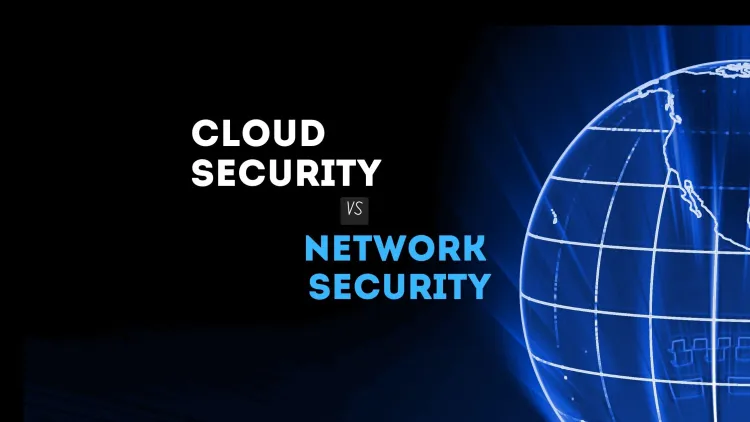Cloud Security vs. Network Security: Certification Guide for Cyber Pros
Cloud security and network security are distinct yet complementary fields in cybersecurity. Cloud security focuses on protecting data, applications, and services in cloud environments, while network security secures on-premises infrastructure and internal communication. Both are crucial for modern organizations to safeguard digital assets from ever-evolving cyber threats. Key certifications, like CCSP for cloud security and CISSP for network security, help professionals specialize and thrive in these fields. With the rise of hybrid environments, expertise in both areas is becoming increasingly valuable.

In today’s digital-first world, organizations rely heavily on cloud-based services and network infrastructures to store, process, and share data. With the rise of cyber threats, the demand for professionals skilled in cloud security and network security has surged. Both domains are critical, yet they differ in their scope, challenges, and required skill sets. This blog explores the key differences between cloud security and network security, their importance, and the certifications you need to excel in both fields.
What is Cloud Security?
Cloud security focuses on protecting data, applications, and services hosted on cloud platforms. It ensures that cloud environments—whether public, private, or hybrid—remain secure from unauthorized access, data breaches, and cyberattacks. With the rapid adoption of services like Amazon Web Services (AWS), Microsoft Azure, and Google Cloud, safeguarding these platforms has become a top priority.
Key Components of Cloud Security
- Identity and Access Management (IAM): Controls access to cloud resources.
- Data Encryption: Protects sensitive information during transit and storage.
- Compliance Management: Ensures adherence to regulatory frameworks like GDPR, HIPAA, and PCI DSS.
- Threat Monitoring: Detects and mitigates threats using advanced tools like SIEM (Security Information and Event Management).
What is Network Security?
Network security involves protecting an organization’s internal infrastructure, including routers, firewalls, and servers, from unauthorized access, misuse, and attacks. It ensures the safety of data as it travels across the network.
Key Components of Network Security
- Firewalls: Block unauthorized traffic.
- Intrusion Detection and Prevention Systems (IDPS): Identify and respond to potential threats.
- Virtual Private Networks (VPNs): Secure remote access to internal networks.
- Endpoint Security: Protects devices like laptops, desktops, and mobile phones.
Cloud Security vs. Network Security: Key Differences
| Aspect | Cloud Security | Network Security |
|---|---|---|
| Focus | Protects cloud-hosted data and applications. | Secures on-premises network infrastructure. |
| Primary Threats | Misconfigured storage, API vulnerabilities. | Unauthorized access, malware, phishing. |
| Tools | IAM, encryption, CASBs, cloud firewalls. | Firewalls, VPNs, IDPS, endpoint protection. |
| Management | Shared responsibility (cloud provider and user). | Fully managed by the organization. |
| Flexibility | Adapts to dynamic cloud environments. | Primarily static, focused on internal setups. |
Why Both Are Crucial
Organizations rely on both cloud security and network security to achieve holistic protection:
- Cloud Security: Ensures data security in highly flexible and scalable environments.
- Network Security: Protects the foundation of communication and data transfer.
A successful cybersecurity strategy integrates both, as attackers often exploit weaknesses in one to compromise the other.
Top Certifications for Cloud Security
1. Certified Cloud Security Professional (CCSP)
- Issued By: (ISC)²
- Focus: Cloud security architecture, governance, compliance, and operations.
- Best For: Security professionals transitioning to cloud environments.
2. AWS Certified Security – Specialty
- Issued By: Amazon Web Services (AWS)
- Focus: Securing AWS cloud platforms, including IAM, DDoS protection, and monitoring.
- Best For: Professionals working with AWS.
3. Google Professional Cloud Security Engineer
- Issued By: Google Cloud
- Focus: Security on Google Cloud Platform (GCP), including compliance and IAM.
- Best For: GCP security specialists.
4. Microsoft Certified: Azure Security Engineer Associate
- Issued By: Microsoft
- Focus: Implementing Azure security controls, threat protection, and identity management.
- Best For: Azure-focused security roles.
Top Certifications for Network Security
1. Certified Information Systems Security Professional (CISSP)
- Issued By: (ISC)²
- Focus: Broad cybersecurity principles, including network security.
- Best For: Professionals seeking leadership roles.
2. Cisco Certified CyberOps Associate
- Issued By: Cisco
- Focus: Network intrusion detection, incident response, and forensic analysis.
- Best For: Entry-level network security roles.
3. CompTIA Security+
- Issued By: CompTIA
- Focus: Fundamental network security concepts, including threat management.
- Best For: Beginners in cybersecurity.
4. Certified Ethical Hacker (CEH)
- Issued By: EC-Council
- Focus: Ethical hacking techniques to identify and fix network vulnerabilities.
- Best For: Penetration testers and network security professionals.
Choosing the Right Path
Opt for Cloud Security If:
- You work with cloud platforms like AWS, Azure, or GCP.
- You are interested in dynamic environments with a shared responsibility model.
- You want to specialize in securing SaaS, IaaS, or PaaS setups.
Opt for Network Security If:
- You manage or secure traditional IT infrastructures.
- You prefer working with firewalls, VPNs, and endpoint protection.
- You aim for roles focused on internal security operations.
The Future of Cloud and Network Security
The lines between cloud security and network security are increasingly blurring, as hybrid environments combine both. Emerging technologies, such as AI-driven threat detection, zero-trust models, and 5G networks, are reshaping these domains. Professionals equipped with skills in both areas will be in high demand to meet the challenges of tomorrow’s cybersecurity landscape.
Conclusion
Both cloud security and network security are indispensable in protecting modern digital infrastructures. Whether you choose to specialize in one or master both, certifications like CCSP, CISSP, and CEH can pave the way for a rewarding career. As cyber threats evolve, staying certified and up-to-date will ensure you remain a valuable asset in the cybersecurity industry.
Start your journey today and make an impact in safeguarding the digital world!
FAQ:
1. What is the primary focus of cloud security?
Cloud security focuses on protecting data, applications, and services hosted on cloud platforms from unauthorized access and cyber threats.
2. How does network security differ from cloud security?
Network security focuses on safeguarding on-premises infrastructure, including routers, firewalls, and servers, ensuring secure data transmission within an organization’s internal network.
3. Why are cloud security and network security both essential?
Together, they provide holistic protection, as cloud security safeguards external environments while network security secures internal infrastructure.
4. What are the key certifications for cloud security professionals?
Some top certifications include Certified Cloud Security Professional (CCSP), AWS Certified Security – Specialty, and Google Professional Cloud Security Engineer.
5. What are the top certifications for network security professionals?
Leading certifications include Certified Information Systems Security Professional (CISSP), CompTIA Security+, and Certified Ethical Hacker (CEH).
6. What tools are commonly used in cloud security?
Identity and Access Management (IAM), data encryption, Cloud Access Security Brokers (CASBs), and cloud firewalls are common tools.
7. What tools are widely used in network security?
Firewalls, Intrusion Detection and Prevention Systems (IDPS), Virtual Private Networks (VPNs), and endpoint protection tools are essential for network security.
8. How do threats differ in cloud and network security?
Cloud security threats often involve API vulnerabilities and misconfigured storage, while network security threats include malware, phishing, and unauthorized access.
9. Which career path should I choose: cloud security or network security?
Opt for cloud security if you work with platforms like AWS, Azure, or GCP. Choose network security if you manage traditional IT infrastructure or prefer internal security operations.
10. What is the future of cloud and network security?
Both domains are evolving with hybrid environments, AI-driven threat detection, zero-trust models, and 5G networks, creating opportunities for skilled professionals.












![Top 10 Ethical Hackers in the World [2025]](https://www.webasha.com/blog/uploads/images/202408/image_100x75_66c2f983c207b.webp)

![[2025] Top 100+ VAPT Interview Questions and Answers](https://www.webasha.com/blog/uploads/images/image_100x75_6512b1e4b64f7.jpg)









